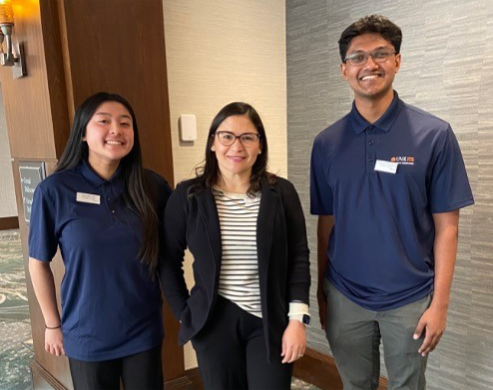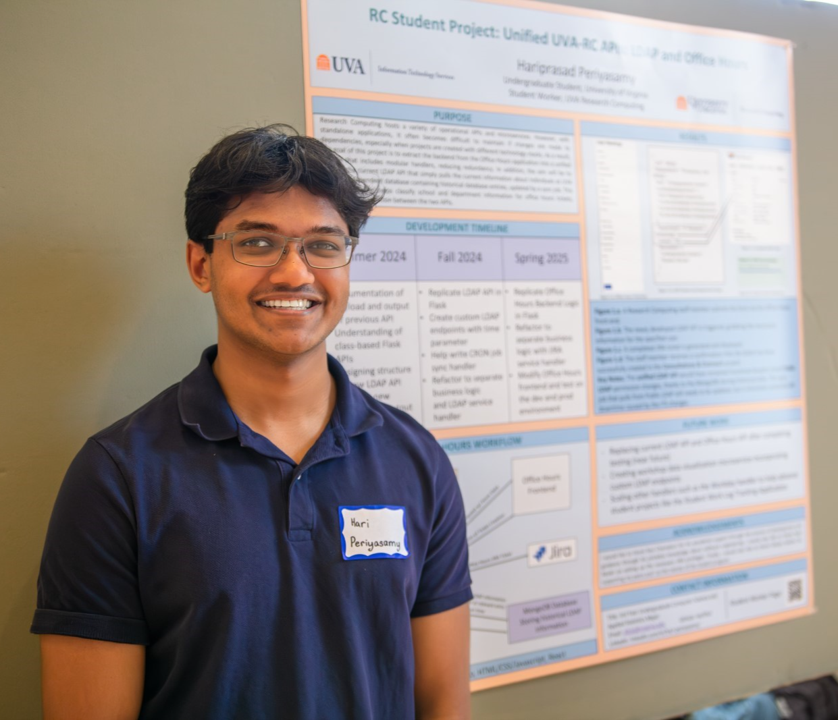
As a student worker at UVA Research Computing, Hari Periyasamy gained practical experience in software development while taking on leadership roles. He contributed to maintaining and improving the team’s website, developed APIs, and helped onboard and support fellow students. Through these opportunities, Hari built important skills in teamwork, communication, and professional software development. In this Q&A, he shares how his time at Research Computing expanded his technical knowledge, boosted his confidence in public speaking, and prepared him for a software engineering internship at Amazon.
Hari Periyasamy
Major: Computer Science and Applied Statistics
Relevant Interests: Software development
Previous Experience: I served as the program mentor in the UVA Development Hub, working alongside a Research Computing staff member.
What kinds of responsibilities and opportunities did you have as a student worker?
During my time at Research Computing, I maintained the website by routinely implementing styling updates and feature updates. I also contributed to API development as part of the DevOps team. Throughout the semester, I assumed a leadership role by assisting with onboarding and providing ongoing support to Gladys Andino, manager of Research Computing’s student worker program.
What are some of the most important skills you developed or lessons you learned during your work at Research Computing?
During my internship, I learned several essential practices for organizational success. First, being proactive and engaging with staff builds trust and demonstrates responsibility. Second, meticulous attention to detail and thorough documentation not only validates the quality of work but also guides future student workers and staff in understanding completed tasks. Finally, I discovered the importance of asking clarifying questions — understanding the “why” behind tasks can streamline the development process and prevent hours of unnecessary work.
Can you share a project or accomplishment from your time as a student worker that you’re especially proud of?
I am most proud of my work on the Lightweight Directory Access Protocol API. Prior to this, my software development experience was limited to personal projects. This role challenged me to design and integrate within an existing codebase, which proved invaluable during iterative development. It significantly expanded my technical knowledge and experience as a computer science major.
I have come to appreciate the importance of structured development for long-term maintenance. Therefore, I hope my primary impact was delivering software that adheres to fundamental development principles, making future enhancements and maintenance more efficient for the team.
How did the UVA Research Computing team support your growth and learning throughout your time there?
Gladys was instrumental in ensuring that we worked on projects that aligned with both the team’s goals and our technical development. Additionally, the staff members were always available as resources once projects were assigned, offering guidance and support to help us progress.
How has this experience helped prepare you for your future academic or professional goals?

After this semester, I am pursuing an internship at Amazon (AWS) as a Software Development Engineer Intern. My experience at UVA Research Computing played a heavy role in obtaining that internship, as the projects that I mentioned in my resume covered a wide variety of topics, including API development, continuous integration/continuous delivery involvement, and website refactoring. Working in an environment where I had to be ready for any type of project strengthened my overall knowledge and accelerated how quickly I learn new technologies.
Having the chance to present what I’d been working on in Research Computing really helped me improve my public speaking, and talking in interviews felt a lot easier, which boosted my confidence.
What advice would you give to other students who are interested in research computing?
My final advice to those that are interested kind of falls in line with the things that I have learned throughout my time at Research Computing. You should try to put yourself out there and embrace failure as that is truly one of the best ways to learn. Ultimately, just make sure to put your best effort forward.
If you make the most of it, Research Computing is a truly valuable resource, and I look forward to returning for the next two semesters.
Are you a student interested in research computing?
See how to join the Student Worker Program >